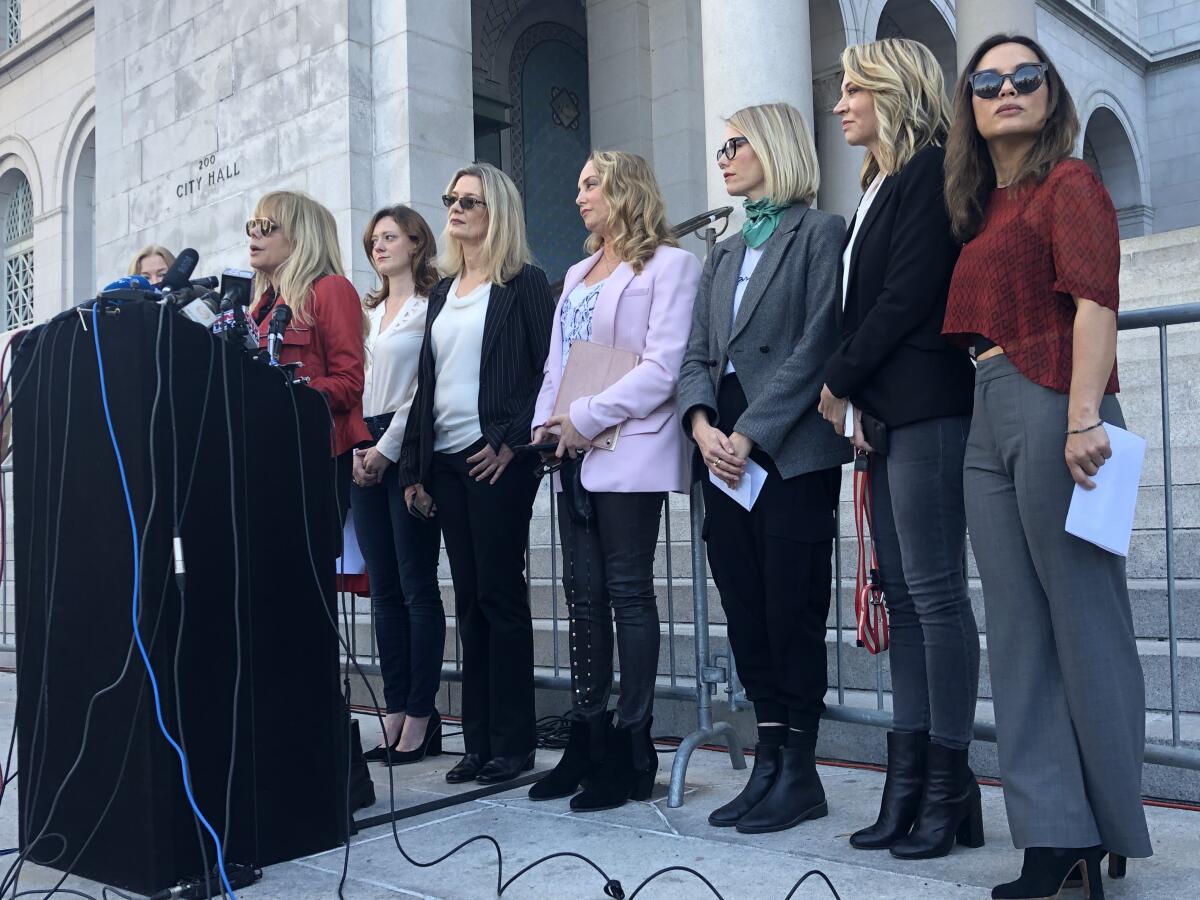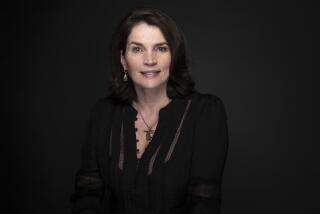Harvey Weinstein conviction could pave the way for more sexual assault prosecutions

- Share via
The morning after Harvey Weinstein was convicted of rape, a dozen women who have accused the fallen movie mogul of sexual misconduct stood on the steps of L.A. City Hall and spoke of the dawn of a new era.
Actress Caitlin Dulany told reporters that on Monday, in the first few hours after Weinstein was handcuffed and taken into custody, she saw a little girl running around in the grocery store.
“You will have a different world because of what happened today,” Dulany said she imagined telling the girl. “It will not be the same. It will never be the same.”
Dulany’s hopefulness in the aftermath of the historic verdict is more than justified, according to legal experts and advocates for survivors of sexual assault.
Though the Weinstein conviction is no panacea for the pervasiveness of sexual abuse in society, they say, it expands the possibilities for which sex crimes can be successfully tried in a court of law. And it could embolden prosecutors to take on complex rape cases that they would have previously been reluctant to file.
“I think this verdict will encourage prosecutors to rethink the idea that sex crime cases are too difficult to prosecute,” said Debra Katz, a civil rights and employment lawyer who has represented several women who have spoken out about Weinstein. “This shows that juries have an ability to discern complicated facts, and they reached this result even though there was a lot of smoke and mirrors from the defense team.”
Prosecutors wield an enormous amount of influence over which cases make it to a courtroom. And district attorney offices across the U.S. take on relatively few sexual assault cases because most are seen as unwinnable.
Out of every 1,000 allegations of rape, 13 cases will get referred to a prosecutor and seven will lead to a felony conviction, according to the Rape, Abuse and Incest National Network.
“Rape cases are difficult because as a society, we hold misconceptions about what rape looks like, what rape trauma looks like, and how someone is supposed to act after being raped,” said Kristen Gibbons Feden, who successfully prosecuted Bill Cosby as an assistant district attorney in Pennsylvania. “Those misconceptions sometimes guide the rules and laws being made and how the verdicts are rendered by a judge or jury.”
Manhattan Dist. Atty. Cyrus R. Vance Jr. was criticized for deciding not to press forcible touching charges against Weinstein in 2015, when a 22-year-old Italian model accused the producer of groping her at the Tribeca Film Center. Vance was under immense political pressure to indict Weinstein when he finally did so in 2018.
“This is a new day,” Vance said after the verdict was announced. “Rape is rape whether the survivor reports within an hour, within a year or perhaps never. It’s rape despite the complicated dynamics of power and consent after an assault. It’s rape even if there is no physical evidence.”
Weinstein’s Manhattan trial was rife with complexities that might have prompted a blanket acquittal. The two women whose accounts led to his New York charges — Jessica Mann and Mimi Haley — both engaged in consensual sex with the Miramax co-founder after he allegedly assaulted them. Weinstein’s defense team also argued that the women were using Weinstein to leverage professional gains.
Prosecutors pushed back against the idea that staying in touch with an alleged abuser means that the abuse didn’t happen. They called to the stand forensic psychiatrist Barbara Ziv, who debunked myths around how a rape victim might behave after an assault.
Based on their decision, jurors seemed to take those sentiments to heart, even though they chose to acquit Weinstein of the two more serious counts of predatory sexual assault.
Due to the public’s still-evolving understanding of consent, prosecutors usually don’t pursue rape cases unless there is clear evidence of physical force, said Wendy Murphy, professor of sexual violence law at New England Law in Boston and a former sex crimes prosecutor.
“It’s hard to assess whether someone used the kind of force sufficient to overcome another person’s will,” Murphy said.
So sexual misconduct that takes place in professional settings, where abusers are more likely to wield their figurative power against victims rather than actual weapons, is customarily handled through civil litigation.
One of the counts Weinstein was found guilty of — rape in the third degree — requires a lack of consent, but not use of force. The conviction signals that jurors understood that Weinstein’s methods of coercion still rose to the standards of rape.
“Women will compare their own circumstances to the narrative they’ve read about Weinstein, and they will be more willing to call the police,” Murphy said.
Advocates contend that the Weinstein verdict goes a step beyond the cultural progress marked by Bill Cosby’s rape trial. In that case, Katz said, it was easier for jurors to sift through the issues of consent presented by the defense because Cosby drugged his victims before assaulting them.
“What Weinstein did was a more difficult thing for jurors to wrap their head around, and yet the jury still understood it was rape,” Katz said. “It’s a product of the education that has taken place as a result of the #MeToo movement.”
Colby Bruno, senior legal counsel at the Victim Rights Law Center, said she hopes that through the Weinstein trial, prosecutors will see that rape cases have a better chance of succeeding when a jury hears from more than one accuser. Though the Weinstein charges were based on the accusations of Haley and Mann, six women in all testified in the movie mogul’s trial.
“I want to see police and prosecutors look harder for other victims,” Bruno said. “There’s strength in numbers.”
The Silence Breakers, a group that represents a fraction of the more than 90 women who have publicly accused Weinstein of sexual misconduct, sought to embody that strength as they stood side-by-side outside L.A. City Hall on Tuesday.
“This was never about Harvey. This was about what we as a society will tolerate,” actress and trauma specialist Louise Godbold told reporters. “And the message is clear: Your power and money will not protect you.”
More to Read
Sign up for Essential California
The most important California stories and recommendations in your inbox every morning.
You may occasionally receive promotional content from the Los Angeles Times.











